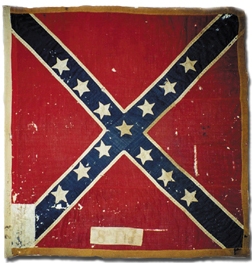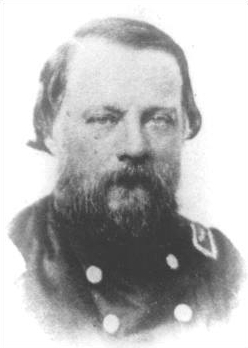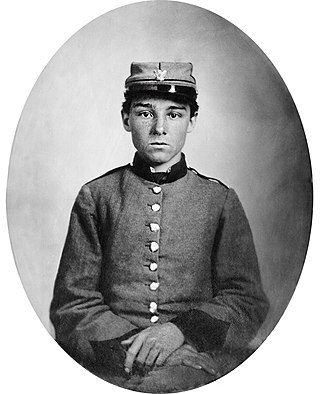The 50th Georgia Infantry Regiment was an infantry regiment raised by the state of Georgia to fight for the Confederacy in the American Civil War.
Cobb's Legion was an American Civil War Confederate States Army unit that was raised from the state of Georgia by Thomas Reade Rootes Cobb during the summer of 1861. A legion in the Civil War usually meant a combined-arms unit, consisting of two or three branches of the military: infantry, cavalry, and artillery. When it was originally raised, the Georgia Legion comprised seven infantry companies, four cavalry troops, and a single battery. The concept was not practical for Civil War armies and, early in the war, the individual elements were assigned to other organizations.
The 10th Georgia Infantry Regiment was an infantry regiment that served in the Confederate States Army during the American Civil War. It participated in most of the key battles of Robert E. Lee's Army of Northern Virginia.

The 3rd Arkansas Infantry Regiment was a regiment of the Confederate States Army during the American Civil War, and the most celebrated unit from the state. Formed and initially commanded by Colonel Albert Rust, and later falling under the command of Colonel Van. H. Manning, the regiment was part of the Army of Northern Virginia, serving under General Robert E. Lee. The 3rd Arkansas Infantry Regiment served for the duration of the war, from the late months of 1861, through to its surrender at Appomattox Court House in 1865. It was the only regiment from the state of Arkansas to serve the entire war in the Eastern Theater, where most of the major Civil War battles were fought. It was also the only Arkansas regiment to initially sign up for the duration of the Civil War, with all other regiments from the state signing on for a one-year enlistment.
The 24th Georgia Infantry Regiment was an infantry regiment in the Confederate States Army during the American Civil War. The regiment was part of Thomas Cobb's brigade at the Battle of Fredericksburg.

The 18th Georgia Infantry Regiment was an infantry regiment in the Confederate Army during the American Civil War. Originally brigaded with the three Texas regiments of John Bell Hood's Texas Brigade, it was transferred to Thomas R.R. Cobb's Georgia Brigade after the Battle of Antietam in late 1862. After General Cobb was mortally wounded at the Battle of Fredericksburg, the original colonel of the 18th Georgia, William T. Wofford, became Brigadier General of the Georgia Brigade.

The 2nd Florida Infantry Regiment was an infantry regiment that fought in service of the Confederate States Army in the American Civil War.
The 21st Regiment, Mississippi Infantry was a Confederate infantry regiment from Mississippi in the American Civil War. The regiment was involved in several well-known battles including the battles of Antietam, Chancellorsville, Gettysburg and Chickamauga.

The 5th Florida Infantry Regiment served in E.A. Perry's Florida Brigade alongside the 2nd and 8th Florida. Perry's Brigade served under Anderson’s Division of Longstreet’s First Corps, of the Army of Northern Virginia.

The 8th Florida Infantry Regiment was a unit of the Confederate States Army during the American Civil War. Serving in the Army of Northern Virginia throughout the war; it fought in most battles of the Eastern Theater.

The 108th New York Infantry Regiment was an infantry regiment in the Union Army during the American Civil War.

The 93rd New York Infantry Regiment was an infantry regiment in the Union Army during the American Civil War.

The 76th New York Infantry Regiment was an infantry regiment in the Union Army during the American Civil War.

The 94th New York Infantry Regiment was an infantry regiment in the Union Army during the American Civil War. The regiment has the distinction of being the last volunteer infantry regiment to muster out of the Army of the Potomac.

The 86th New York Infantry Regiment was an infantry regiment in the Union Army during the American Civil War.
The 3rd Regiment Maryland Volunteer Infantry was an infantry regiment that served in the Union Army during the American Civil War. It was noted for its holding the high ground at the center of the line at Antietam as part of Stainrook's 2nd Brigade, Greene's 2nd Division of Mansfield's XII Corps.

The 1st Louisiana Infantry Regiment was a unit of volunteers recruited in Louisiana that fought in the Confederate States Army during the American Civil War. Formed in April 1861, the regiment was sent to fight in the Eastern Theater of the American Civil War. Joining a brigade of Louisiana regiments, it fought at Malvern Hill, Second Bull Run, Antietam, and Fredericksburg in 1862, at Chancellorsville, Second Winchester, Gettysburg, and Mine Run in 1863, and at the Wilderness, Spotsylvania, Monocacy, Third Winchester, Fisher's Hill, Cedar Creek, and Petersburg in 1864, and at Appomattox in 1865. At Appomattox, the regiment was only a shadow of its former self.

The 2nd Louisiana Infantry Regiment was a unit of volunteers recruited in Louisiana that fought in the Confederate States Army during the American Civil War. Formed in May 1861, the regiment was sent to fight in the Eastern Theater of the American Civil War. Its first action took place during the Siege of Yorktown. The regiment suffered very heavy losses at Malvern Hill. After joining an all-Louisiana brigade, it fought at Cedar Mountain, Second Bull Run, Antietam, and Fredericksburg in 1862, at Chancellorsville, Second Winchester, Gettysburg, and Mine Run in 1863, and at the Wilderness, Spotsylvania, Cold Harbor, Monocacy, Third Winchester, Fisher's Hill, Cedar Creek, and Petersburg in 1864, and at Appomattox in 1865. The regiment lost over 100 men at both Second Bull Run and Chancellorsville. A company-sized remnant surrendered at Appomattox.

The Louisiana Guard Battery was an artillery unit recruited from volunteers in Louisiana that fought in the Confederate States Army during the American Civil War. Formed from an infantry company sent to fight in the Eastern Theater of the American Civil War, it was converted to an artillery company in July 1861. The battery fought at Cedar Mountain, Second Bull Run, Antietam, and Fredericksburg in 1862, and at Chancellorsville, Second Winchester, and Gettysburg in 1863. Most of the soldiers and all of the battery's guns were captured at Rappahannock Station on 7 November 1863. The surviving gunners manned heavy artillery pieces in the defenses of Richmond, Virginia, and the battery's remnant surrendered at Appomattox.

The 8th Louisiana Infantry Regiment was a unit of volunteers recruited in Louisiana that fought in the Confederate States Army during the American Civil War. Formed in June 1861, the regiment was sent to fight in the Eastern Theater of the American Civil War. Joining a brigade of Louisiana regiments, it fought in Jackson's Valley campaign and at Gaines' Mill, Malvern Hill, Second Bull Run, Antietam, and Fredericksburg in 1862. The regiment served at Chancellorsville, Second Winchester, Gettysburg in 1863. At Rappahannock Station in November 1863, most of the regiment was captured. The unit fought at the Wilderness, Spotsylvania, Cold Harbor, and the Valley campaigns of 1864. It served at Petersburg starting in December 1864 and surrendered at Appomattox in April 1865.










